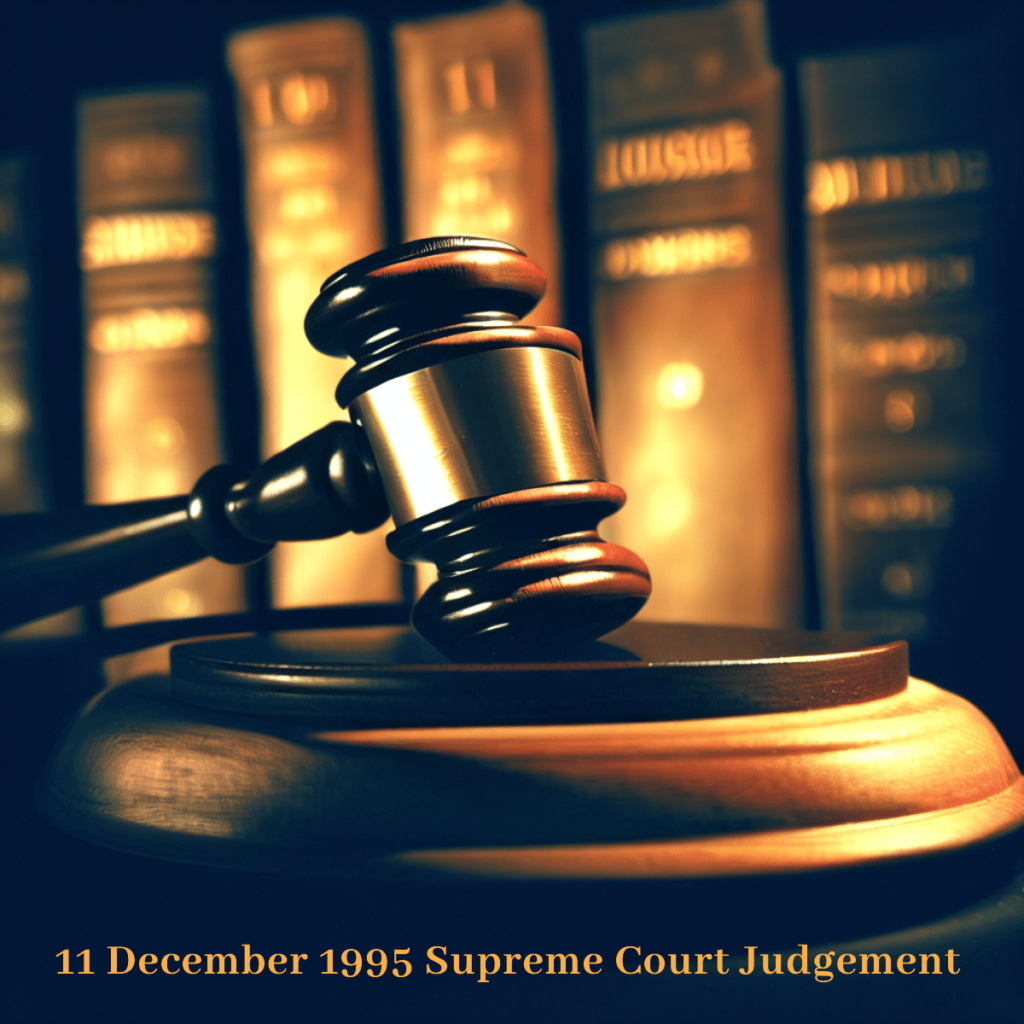
11 December 1995 Judgment on Hindutva and Electoral Corrupt Practices
In a significant legal landmark, a judgment by the Indian Supreme Court dating back to December 11, 1995, has once again stirred the debate around the interpretation of Hindutva and its role in the electoral arena. The case in question revolves around allegations of electoral corrupt practices, with a focus on the use of Hindutva during an election campaign. The court’s decision not only addressed the specific charges but also delved into the broader question of the relationship between Hindutva, politics, and religion.
Hindutva( 11 December 1995 ): More than Just Religion
One of the key points of contention in this historical case was whether the use of Hindutva in election campaigns could be deemed a corrupt practice under Section 123 of the Representation of the People Act. The Act defines corrupt practices during elections and aims to maintain the purity of the electoral process. However, the court’s verdict made it clear that Hindutva, as a term and concept, goes beyond religion.
Justice JS Verma’s Notable Interpretation 11 December 1995
On December 11, 1995, a bench of the Supreme Court, led by Justice JS Verma, pronounced its views on Hindutva. The court described Hindutva as “the way of life of the Indian people” and emphasized that it should not be limited to just religion. This profound interpretation by the Supreme Court established that Hindutva encompasses cultural, social, and political aspects of life in India. Consequently, the court refused to classify the use of Hindutva as a corrupt practice under the Representation of the People Act.
Understanding the Representation of the People Act
Before delving deeper into the court’s judgment and its implications, it is crucial to understand the Representation of the People Act, which forms the legal framework for conducting elections in India. Section 123 of this Act enumerates various corrupt practices that are strictly prohibited during elections. These practices include bribery, undue influence, and impersonation, among others.
The Act aims to ensure that elections remain free and fair, enabling voters to make informed choices without undue influence or manipulation. It is in this context that the issue of Hindutva’s use during election campaigns became a subject of scrutiny.
Allegations of Electoral Corrupt Practices
The case under consideration involved allegations of electoral corrupt practices against a candidate who had allegedly made statements invoking Hindutva during the campaign. The petitioner argued that such statements amounted to an appeal for votes on the grounds of religion. Which is explicitly prohibited under Section 123 of the Act.
The petitioner highlighted specific instances in which the candidate had declared, during a campaign meeting at Shivaji Park, Dadar, on February 24, 1990, that “the first Hindu State will be established in Maharashtra.” Similar statements allegedly surfaced in other public meetings conducted on various dates and at different locations. The petitioner argued that these statements amounted to corrupt practices because they were seen as appeals for votes based on religious grounds.
The Court’s Interpretation
In response to the petitioner’s claims, the Supreme Court embarked on a meticulous examination of the case. It is essential to note that the court did not take the allegations lightly; instead, it sought to understand the nuanced relationship between religion, politics, and Hindutva in the Indian context.
The court acknowledged that the candidate had indeed made statements regarding the establishment of the “first Hindu State.” However, it firmly asserted that these statements, even though controversial, did not constitute an appeal for votes on religious grounds. The court’s reasoning rested on its comprehensive interpretation of Hindutva as a broader cultural and social concept, transcending the boundaries of mere religion.
The verdict emphasized that while the candidate’s statements might have been controversial and even offensive to some. They did not fall within the purview of corrupt practices as defined by Section 123 of the Representation of the People Act. The court’s decision highlighted the importance of distinguishing between religious appeals and expressions related to cultural and social beliefs.
The Hindutva Debate
The Supreme Court’s judgment reignited the longstanding debate surrounding Hindutva, its interpretation, and its place in Indian politics. The court’s assertion that Hindutva encompasses the way of life of the Indian people added a new dimension to the understanding of this concept.
Hindutva, often associated with Hindu nationalism, has been a contentious issue in Indian politics.
It has served as both a unifying force and a divisive factor, depending on the perspective of those involved. The court’s clarification that Hindutva goes beyond religion opened the door for politicians to utilize this concept in their campaigns without running afoul of electoral laws.
The Verdict’s Implications
The judgment has far-reaching implications not only for electoral politics but also for the broader sociopolitical landscape in India. By recognizing Hindutva as a multifaceted concept. The court has provided political leaders with a broader canvas for engaging in political discourse.
While the judgment has clarified the distinction between religious appeals and expressions related to cultural and social beliefs. It also highlights the importance of responsible and respectful campaigning. Politicians must exercise caution when addressing sensitive issues to maintain the integrity of the electoral process.
The court’s verdict reflects the delicate balance between freedom of expression and the need to prevent corrupt practices during elections. It calls for a nuanced understanding of the multifaceted nature of Hindutva and its role in Indian society. Emphasizing the importance of constructive political debates that unite rather than divide the nation.
The Role of the Representation of the People Act
The Representation of the People Act plays a pivotal role in regulating election-related activities in India. The Act strives to guarantee the fair conduct of elections while preventing the influence of corrupt practices. However, one must interpret the Act in a way that upholds the fundamental principles of democracy, including freedom of expression.
The Act prohibits corrupt practices that can undermine the electoral process, such as bribery and undue influence. Still, it does not seek to curtail legitimate political discourse, even on sensitive topics like religion and identity. The court’s decision in this case reaffirms the Act’s commitment to upholding democratic values while maintaining the purity of elections.
Conclusion: Judgment 11 December 1995
In conclusion, the Supreme Court judgment on Hindutva and electoral corrupt practices has significant implications for Indian politics. By recognizing Hindutva as more than just religion. The court has provided political leaders with a broader canvas for engaging in political discourse.
While the judgment has clarified the distinction between religious appeals and expressions related to cultural and social beliefs. It also highlights the importance of responsible and respectful campaigning. Politicians must exercise caution when addressing sensitive issues to maintain the integrity of the electoral process.
The court’s verdict reflects the delicate balance between freedom of expression and the need to prevent corrupt practices during elections. It calls for a nuanced understanding of the multifaceted nature of Hindutva and its role in Indian society. Emphasizing the importance of constructive political debates that unite rather than divide the nation.
Disclaimer: This post discusses a legal judgment from December 11, 1995. It is provided for informational purposes and does not constitute legal advice. Legal interpretations may have evolved since the date of this judgment. For current legal guidance, consult with a qualified legal professional


Leave a Reply